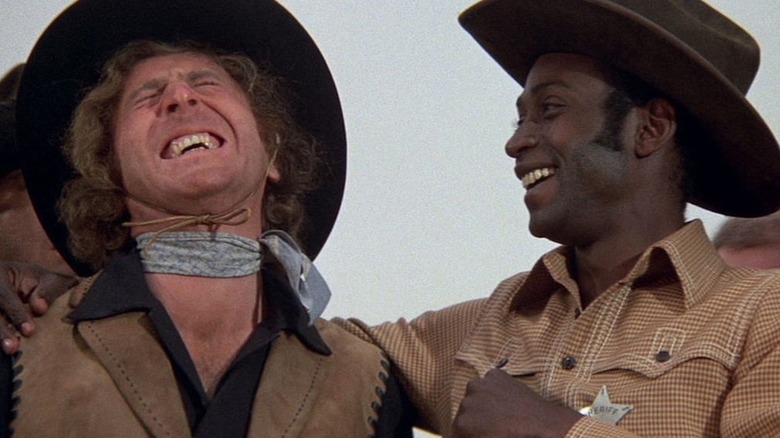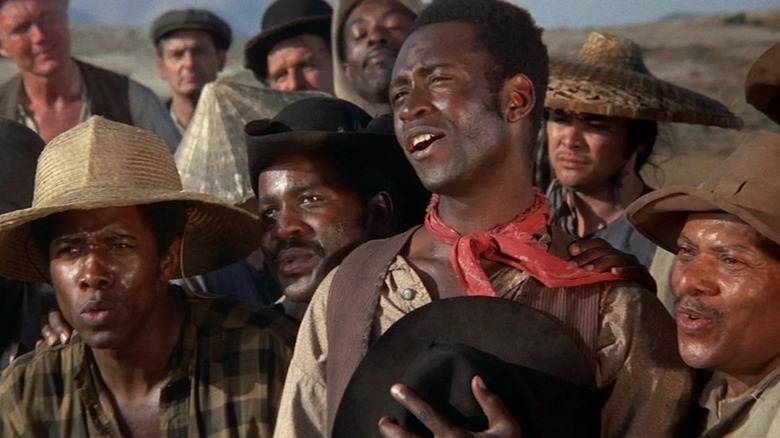Mel Brooks Quit Blazing Saddles For Three Days Out Of Protest
Mel Brooks has been a whirling dervish of comedic invention for over 70 years. Okay, he's slowed down a tad at the age of 97, but he just wrote and produced the long-awaited "History of the World, Part II" last year. You try doing that at the age of 96. How about you simply try living until 96? Until then, you shall marvel at this man's longevity and continued relevance.
That latter quality is perhaps the most remarkable aspect of Brooks' brilliance. We're constantly judging art produced prior to last week on the basis of how well it's aged. What was deemed open to ridicule or even just a slight ribbing in the past might now strike some as mean-spirited or downright offensive. And yet Brooks, who made films considered vulgar at the time of their release, is still considered an unimpeachable master of his craft. And his movies, especially the wildly provocative "Blazing Saddles," have only improved with age.
Why? Because they targeted untenably ignorant and hateful attitudes made by the targets of said intolerance.
Again, "Blazing Saddles" is the perfect example of this approach. Brooks and his mostly Jewish cowriters (Andrew Bergman, Norman Steinberg, and Alan Uger) were well acquainted with anti-Semitism, but when it came to lampooning racism in the form of the Western, the master satirist sought the counsel of Richard Pryor. The African-American stand-up was on the verge of big-screen stardom himself, and, most importantly, lacked a filter. He was a genius-level performer and a razor-sharp observer of human behavior. Pryor's involvement in "Blazing Saddles" was integral to the film's effectiveness. He was so integral that Brooks wanted him to star as the Black sheriff of a lily-white frontier town.
And Brooks was so set on Pryor as his star that he nearly bolted the production when the studio rejected his casting.
He will scare the s*** out of them
In a 2014 interview with Entertainment Weekly timed to the 40th anniversary of "Blazing Saddles" hitting theaters, Brooks praised Pryor's "profound" impact on the screenplay. "He gave me some really beautiful 126th Street, St. Nicholas Ave. [Harlem] lines," said Brooks.
The longer Brooks and his writers worked with Pryor, the more convinced he became that the comedian had to play Sheriff Black Bart. Alas, this didn't fly with Warner Bros, which cited Pryor's drug-related run-ins with law enforcement as evidence that he was unreliable and, thus, uninsurable. Enraged, Brooks quit the film and only came back three days later when Pryor said Cleavon Little would be a terrific Black Bart.
As Brooks told EW:
"Richard came over and said, 'If I was the black sheriff, I could pass for Cuban because I'm coffee-colored. Now, this guy Cleavon Little: He's classy, he has poise, and he's really charming. But he's black as coal. He will scare the s*** out of them.' I said, 'Okay, I'm coming back.'"
Brooks came back alright and knocked out a comedy classic that's lost none of its zip 50 years later. Again, this isn't because Brooks and company had more leeway to use the n-word for laughs. It's the brazen stupidity of the racist characters that make us howl. And Little's sophisticated demeanor provides the perfect contrast to this knee-jerk, unapologetic bigotry. As Wilder's Waco Kid asks of Bart during their first bonding session, "What's a dazzling urbanite like you doing in a rustic setting like this?" Making these white townsfolk look like the uncultured bozos they have no idea they are.

